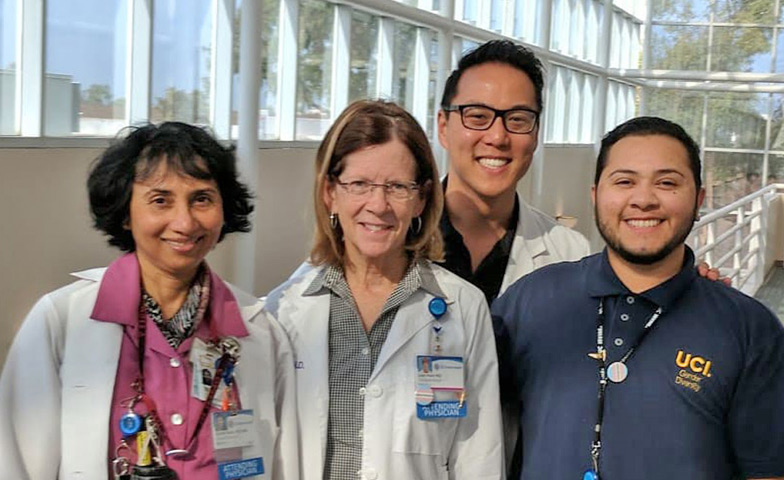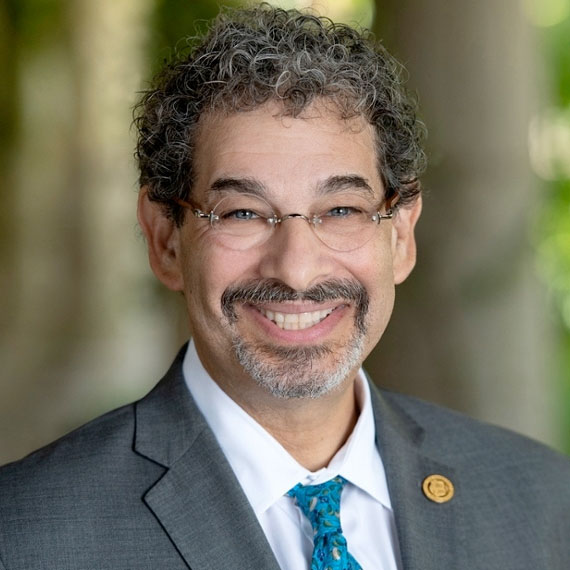Bridging the Gap Series : August 2021
Introduction from Vice Chancellor Steve Goldstein
Imagine walking into a doctor’s office and being refused care or finding that the medical staff does not know how to treat you. For transgender children, these incidents can result in a lifetime of avoidance of medical care, even when ill or injured.
In this installment of our Bridging the Gap series that focuses on health equity, Brit Cervantes, program coordinator for the UCI Pediatric Gender Diversity Program, shines a light on healthcare challenges that gender-nonconforming children face. Their needs can be unique and are often overlooked by the healthcare community. According to a National Institutes of Health report, LGBT youth often refrain from “coming out” to healthcare providers.
Recognizing the health equity struggles that the LGBTQIA+ community confront, we are instituting supportive policies and programs across UCI Health Affairs that include increasing employee and provider training and compliance with Healthcare Equality Index criteria. For example, Candace Burton, associate professor in our Sue & Bill Gross School of Nursing, has incorporated guidance on caring for LGBTQIA+ patients into her Forensic Nurse Examiner Training program, and has published a ‘how-to’ guide for adding this content to nursing education in general. She is also collaborating with other COHS faculty to develop a toolkit for identifying such opportunities across disciplines.
As healthcare providers, we pledge to care for all people, including the vulnerable. We must continue to educate ourselves and offer access to all who enter our offices, clinics and hospitals.
By Brit Cervantes
According to the National Transgender Discrimination Survey: Report on Health and Health Care, which surveyed more than 6,450 transgender and gender non-conforming people, access to healthcare “is regularly denied to transgender and gender non-conforming people.” Key findings:
The report found that when transgender people do receive gender-confirming care, they experience significant benefits: 78% reported improved psychological functioning. Similarly, research shows that children supported in gender identity, and allowed to transition socially, do not have elevated levels of depression and only minimal elevations in anxiety, suggesting that psychopathology is not inevitable for these children.
A guide for LGBT inclusive healthcare for health professionals presented by the National LGBT Health Education Center, identifies three categories of the many barriers to healthcare experienced by the LGBTQ community:
These findings are especially true for transgender patients increasingly susceptible to healthcare discrimination and more likely to be denied care by healthcare professionals than LGB people. This is due to medical professionals and health insurance companies requiring a diagnosis of Gender Dysphoria in order to receive gender affirming medical treatment.
In 2011, Dr. Lynn Hunt, faculty advisor for eQuality, the UCI School of Medicine’s student club working to promote LGBTQ health, recognized the lack of services available for the transgender community in Orange County (OC). Understanding that a supportive clinical environment is critical for the health and well-being of LGBTQ patients, Hunt initiated a unique program to model LGBTQ best practices for other healthcare providers locally and regionally. Working alongside UCI medical and nursing students, she created a health clinic to address the needs of LGBTQ patients in OC. Patients were seen in an after-hours clinic at the UCI Family Health Center in Santa Ana. Transgender patients received gender affirming care, such as hormone replacement therapy, to help align their gender presentation with their gender identity. However, this transgender health program ceased after Hunt retired in 2013.
For the next few years, there were no known options for transgender care in OC beyond miscellaneous providers willing to prescribe hormone replacement therapy. During this period, Dr. Ajanta Naidu, a UCI pediatric endocrinologist, met with colleagues regarding growing numbers of patients seeking hormone therapy for their transition who also needed community resources and supportive services unavailable in a fast-paced clinic setting. Transgender patients were traveling long distances to transgender health centers in San Diego or Los Angeles for care.
Hunt emerged from retirement to join forces with Naidu in launching OC’s first multidisciplinary transgender healthcare services for local gender diverse children, youth and young adults. After considerable research and planning, including discussions with Children’s Hospital Los Angeles program directors and a visit to an established San Diego program, Hunt and Naidu created the UCI Pediatric Gender Diversity Program.

In 2015, FRONTLINE produced Growing Up Trans, a documentary series highlighting the struggles that transgender kids and their families had to navigate to access medical care. The series caught the eye of MaryAnn Pack, chief administrative officer of UCI’s Department of Pediatrics. Upon further research, she found that not only were patients and families travelling well outside of OC, but there were few options for adolescents and patients with Medi-Cal. Prescribing hormones and puberty blockers was not enough. Patients and families needed a comprehensive program that provided clinical care and community support. Something needed to be done, but where to start? As luck would have it, she was approached by Dr. Ajanta Naidu and the work began.
Hunt joined Naidu in building a program to address these needs. Also joining the team were Program Coordinator Brit Cervantes (who is transgender identified themselves) and caring and charismatic Nurse Practitioner, Jeffrey Vu, who provides trans health and sexual healthcare services to adults in the program.
The Gender Diversity Program officially launched in 2016, becoming OC’s only multidisciplinary program caring specifically for the transgender community. Our mission is to increase access to transgender competent and gender affirming care for young people and adults. We expanded our initial clinical services to include sexual health education and HIV prevention, and developed educational opportunities for healthcare professionals, mental health providers, educators and employers who work with transgender and gender-expansive youth. We provide excellent care to patients and ensure that they can exist authentically as themselves in school and other healthcare settings. Since inception, our program has grown an average of 18% per year and we proudly provide care to over 200 patients and their families. Our numbers continue to grow as more families learn about our program.
In 2020, the Gender Diversity Program spearheaded the effort to have UCI Health join the Healthcare Equality Index (HEI), a Human Rights Campaign Foundation (HRC) project. HEI promotes LGBTQ inclusive policies and affirming practices in healthcare facilities and formally recognizes facilities that lead the field in LGBTQ inclusion. UCI Health joined 495 healthcare facilities that achieved a top score of 100 and earned the “Leader in LGBTQ Healthcare Equality” designation. Our program played a critical role in UCI’s designation as an LGBTQ leader.
UCI Health has an opportunity to continue to meet the health needs of the LGBTQIA+ community. OC desperately needs safe, affirming services that address the gender-expansive families we serve. The Gender Diversity Program seeks to close educational gaps and bring affirming providers together to create a network for our patients. Our program hosts quarterly meetings with healthcare providers, mental health professionals, and community organizations to collaborate to support the transgender community in OC and beyond.
These are tumultuous times in public health with 2021 resulting in the most anti-LGBTQ bills in modern history. These bills have swept across the country and aim to prevent transgender youth from participating in sports that affirm their gender identity; make transgender healthcare a felony for medical professionals to provide; and bar transgender people from homeless shelters. The current civil turmoil reminds us that all people deserve to be treated equally and given the chance to thrive. Healthcare providers and community leaders must speak out against anti-LGBTQ legislation to ensure that the rights of all patients are preserved.
About the Author
Brit Cervantes is program coordinator and community education specialist for the UCI Pediatric Gender Diversity Program.

Started in June 2020, Bridging the Gap is a series curated by Vice Chancellor Steve Goldstein, as a way to examine and share our work in closing all gaps to achieve health equity through awareness, understanding, compassion and action. You can also receive the series in your inbox by subscribing to the newsletter.
Category: Digital Publications